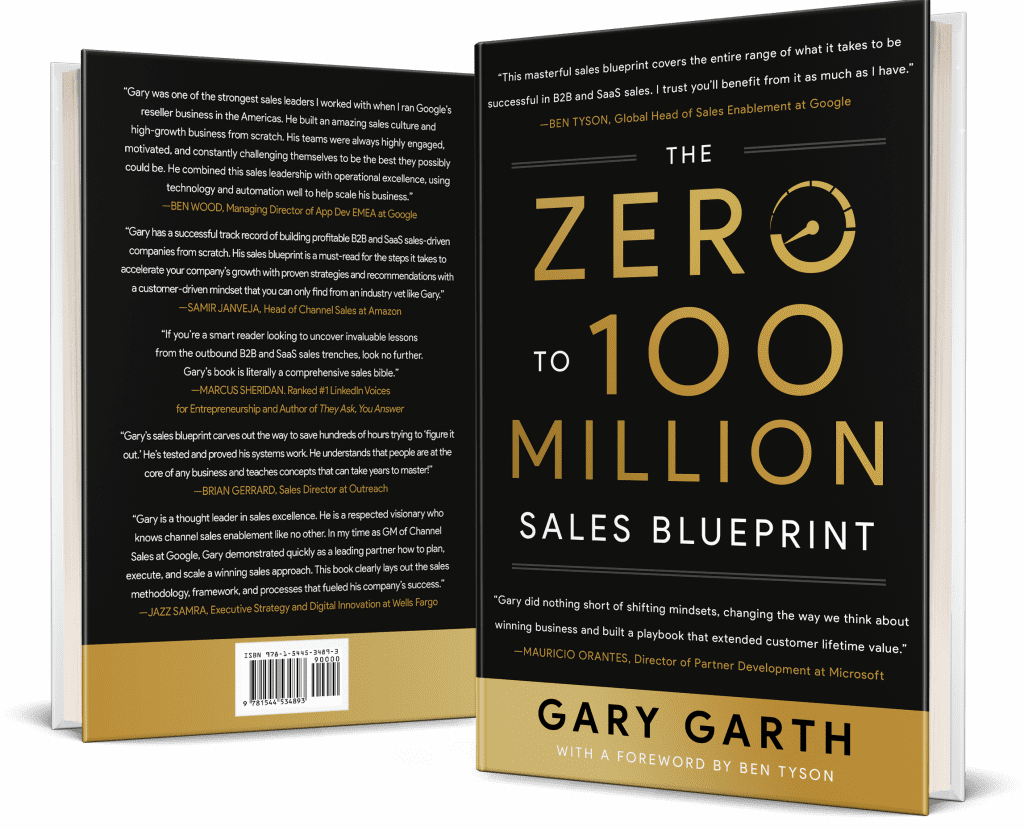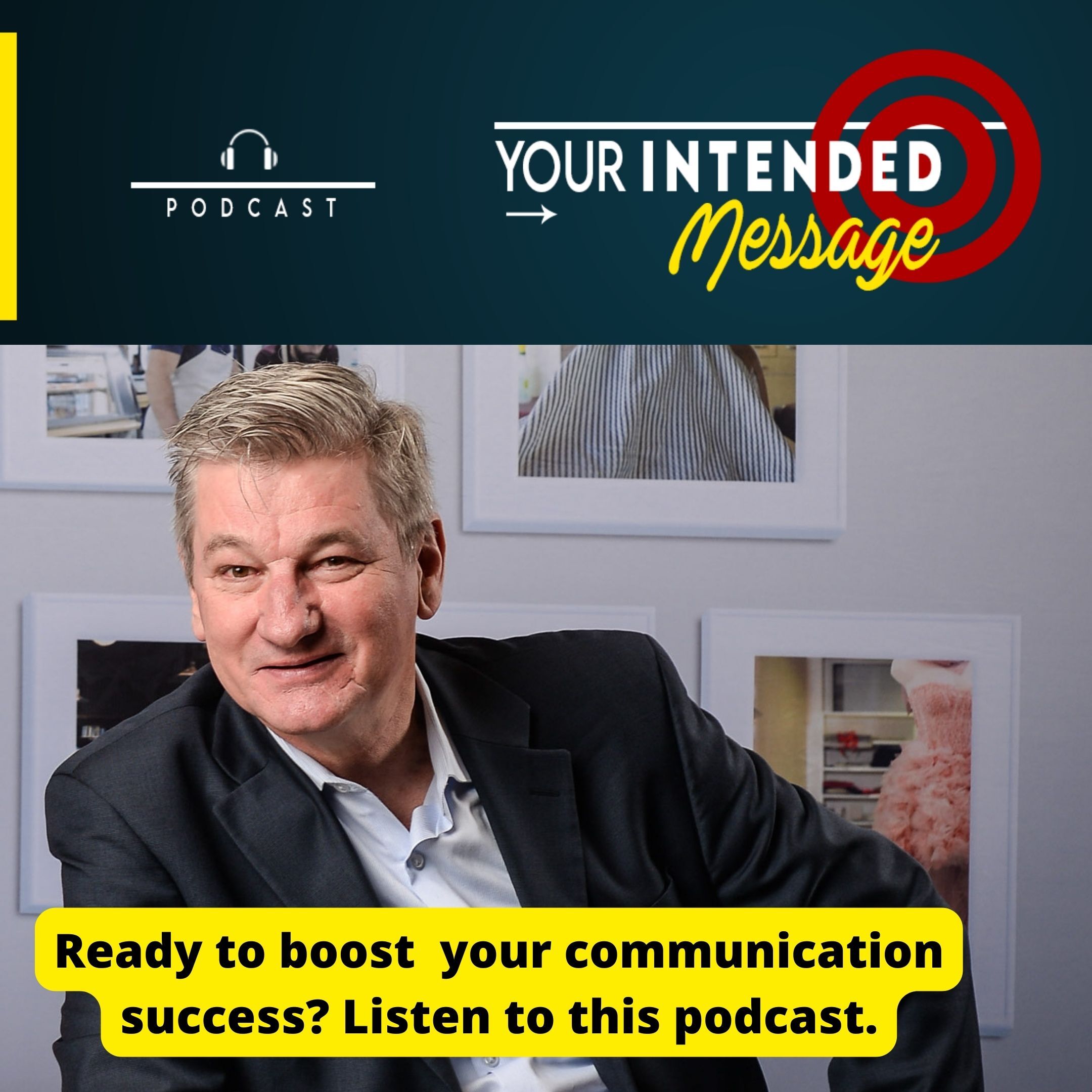
17.1K
Downloads
289
Episodes
The podcast about Effective Communication in Business
Better communication skills will advance your career and business. Are you ready to enhance your understanding and results from better communication? Listen and learn how to deliver Your Intended Message.
Are you willing to cross-examine communication from various perspectives? Would you like to deliver your intended message more effectively?
Listen to Your Intended Message to gain a powerful advantage in your ability to convey your message to your audience, team, clients or marketplace.
Learn from the mistakes and success of communication experts from around the world from different scenarios.
The better communicator has the competitive advantage.
Imagine what that means to you when you improve the success of your next conversation, presentation or message.
Your Host - George Torok
Episodes
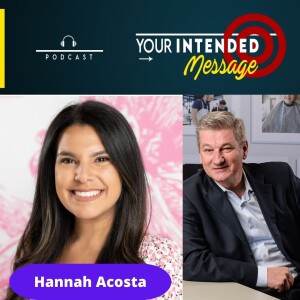
Thursday Jun 15, 2023
Is your content marketing working for you? Hannah Acosta
Thursday Jun 15, 2023
Thursday Jun 15, 2023
What if your social media marketing isn't working?
How can you get valid leads with social media?
Episode 159 ( Hannah is based in Raleigh, NC)
In this conversation with Hannah Acosta we explore:
- Should you publish content on social media
- What are the different type of contacts on social media?
- How can you create evangelists to spread your message?
- Why Social media isn't enough to create evangelists
- How to better engage your clients, fans and prospects?
- Which social media should you use?
- How to reach out and monitor the social media conversations
- What else might you include in your content to interest your customers?
- Who might you partner with when posting on social media?
- What mistakes are made in social media posting?
- How might you appeal to human feelings?
- How to educate your customers without making them feel stupid
- How to excite your customers to promote your message on social media
About our guest Hannah Acosta:
Hannah has launched over 5,000 social campaigns. She has helped generate over 25,000 leads for her clients.
She is the leader of the Social Media Department at Ugly Mug Marketing.
Learn more at
https://www.uglymugmarketing.com/
https://www.linkedin.com/in/hannahacosta/
https://www.instagram.com/uglymugmarketing/
-----
So the natural progression is this idea of moving people, from stranger to friend to customer and ultimately to an evangelist.
An evangelist is somebody who is going to rant and rave about your product or service or about your podcast. And they're going to go and tell all of their friends and family about how they they need to experience your product or service. Right.
And that's ultimately our goal as business owners as entrepreneurs. We want to create evangelists for our business, I hear time and time again, from our clients that referrals are their best clients, right?
If they get a referral, it's so much easier to sell to someone when they've been recommended. Or they talked with a friend or family member or another business owner colleague about why your product or service is the best for them. And so when we approach social media, it's about maintaining the relationship with our existing customers, to get them to feel like we really care about them outside of just that exchange of money, right?
A lot of people think that that journey ends once someone becomes a paying customer. But that's really just the beginning of it because we want to try and get that referral. We want to get them to rant and rave so that they become an evangelist, because that takes a step out of the progression for us.
Once someone becomes an evangelist. They're much more likely to recommend our product or service to their friends and family. So we have to do less work in that stranger area.
-----
Read the rest of this entry »
Tuesday Jun 13, 2023
Weed Words: You Guys
Tuesday Jun 13, 2023
Tuesday Jun 13, 2023
Beware of the Weed Words that Choke your intended message.
Avoid the phrase "YOU GUYS"
Episode 158
You guys
When you’re talking to me, please don’t address me as you guys. Even if I’m part of a group, I don’t want to be addressed as you guys because
That’s gang talk, low class, disrespectful.
-----
Connect with George
www.SpeechCoachforExecutives.com
https://www.linkedin.com/in/georgetorokpresentations/
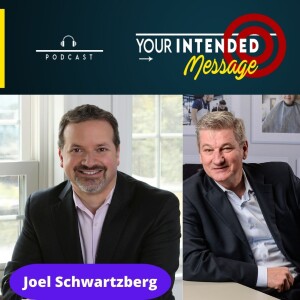
Thursday Jun 08, 2023
What’s your point and how to convey it: Joel Schwartzberg
Thursday Jun 08, 2023
Thursday Jun 08, 2023
Get to the point! Do you know what your point is?
How to make your point
Episode 157 (Joel is based in New Jersey)
In this conversation with Joel Schwartzberg we explore:
- What is a valid point?
- The structure and litmus test of a point
- How to tie sub-points to the big mission
- How many points are too many?
- How to create a meeting agenda based on points
- What the magic words to clarify your point?
- The importance of an action step
- The role of inspiration in your point
About our guest, Joel Schwartzberg:
He was the national champion in public speaking on the collegiate level. He's a frequent contributor to Harvard Business Review, Inc.com and Toastmaster magazine.
He is the author of Get to the Point, Sharpen your Message and make your Words Matter. His clients include State Farm Insurance, Comedy Central, and Brennan Centre for justice.
Learn about his books and services at
-----
Excerpt from this conversation with Joel Schwartzberg:
So the funny thing about points is, we assume we know what one is because we use that language all the time.
Get to the point, what's your point? Did you make your point, and it's presumed that it's something like an idea or a topic may be even a theme.
But the truth of the matter, and what's most instructive and helpful for us is if we reimagined this word point, as something very specific, it's not a topic, it's not a theme.
In essence, it's an argument or a proposition, you're basically making a case for something that if you nail it, your audience will think a new, or they'll take an action step that you want them to take.
And that only happens when you make this proposition, this argument to them a case and you can tell it's a point because you can prove it with data with storytelling with reasonability, with all of Aristotle's tools, going way back when, but just as an example, because that's a description, and I like to really drill down.
Let's talk about podcasting. So if I said to you, George, or you said to me, I want to talk today about podcasting. That's your topic.
But what have you told me about podcasting? Is it on the rise? Or is it becoming antiquated? Is podcasting a good thing or a bad thing? Have there been evolutions in podcasting? Is there a good way to podcast a bad way to podcast? I have no idea the point you're trying to make if you use the word podcasting, and even if you said the importance of podcasting, or the evolution of podcasting?
Are those things good or bad? Is it going up or down? This is why it's so important to distinguish between a theme and a topic or a point.
-----
Read the rest of this entry »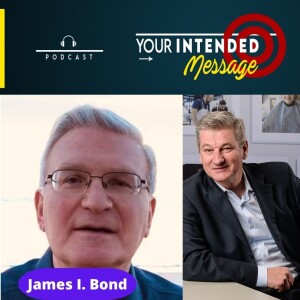
Thursday Jun 01, 2023
Make Messages Stick with Brain Glue: James I. Bond
Thursday Jun 01, 2023
Thursday Jun 01, 2023
How to be more persuasive with emotional triggers
Discover the word tricks to magically be more convincing
Episode 156 (James is based in L.A, California)
In this conversation with James I. bond we explore:
- Why logic often fails to convince
- How to sell using emotional word triggers
- How to make ideas sticky
- How to get people to make decisions faster
- The power of poetry, analogy, alliteration, humor
- 14 techniques to tap into brain glue
- How you can brainstorm for brain glue ideas
About our guest, James I Bond:
James Bond is one of America's leading behavioral management and marketing specialists. He is author of the bestselling book, BRAIN GLUE - How Selling Becomes Much Easier by Making Your Ideas "Sticky"
Learn more about his book at www.BrainGlue.com
-----
Your message is not just words. It's not just numbers. It's passionate emotion. When you can transfer that emotion to the other person, they're more likely to buy from you.
-----
Read the rest of this entry »
Tuesday May 30, 2023
Weed Words: Living under a rock
Tuesday May 30, 2023
Tuesday May 30, 2023
The Weed Words are words you need to avoid when you speak, because they choke your intended message.
Unless you’ve living under a rock
Sweet words of praise – right? Just the opposite.
When you hear this phrase how do you feel?
Respected or insulted?
Why would a speaker use this phrase?
Is this speaker trying to build rapport by suggesting that you are living under a rock?
Is the speaker under the rock with you or standing on top of the rock and grinding down on you?
Is the speaker suggesting that you are equal to them or beneath them?
Perhaps the speaker is proud of something they know that you don’t.
Ha, ha, I know more than you. You’re ignorant and I’m not because I don’t live under the rock like you.
When you hear that phrase, how do you feel?
The speaker suggested that you’ve been living under a rock? What does that say about how the speaker sees you? Is this a sign of respect?
Why would they even suggest such an insulting scenario?
When you hear this phrase what do you see?
What lives under a rock?
Slugs.
Did the speaker just call you a slug?
Why does the speaker see you as a disgusting creature living under a rock.
Would you ever say that to a person that you care about or want to develop a trusting relationship with?
You must be a slimy ignorant creature and I’m here to enlighten you because I am the anointed one.
You’ve been hiding under a rock like a slug and I’m here to enlighten you with my wisdom.
Now bow down to my greatness – you slug.
Should I respond with thanks for calling me a slug you arrogant jerk, now just watch me slime you.
Or should I throw the rock at the speaker?
Beware of the Weed Words
Your host is George Torok
George is a specialist in executive communication skills. That includes conversation and presentation. He’s fascinated by way we communicate and influence behaviors. He delivers training and coaching programs to help leaders and promising professionals deliver the intended message for greater success.
Connect with George
www.SpeechCoachforExecutives.com
https://www.linkedin.com/in/georgetorokpresentations/
https://www.youtube.com/user/presentationskills
https://www.instagram.com/georgetorok/
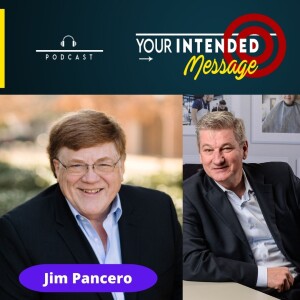
Thursday May 25, 2023
Selling has changed. Have you adapted? Jim Pancero
Thursday May 25, 2023
Thursday May 25, 2023
You can always sell more if you want to
How has selling evolved and how must you adapt?
Episode 154 (Jim is based in Dallas, Texas)
In this conversation with Jim Pancero:
- How the sales person has lost their power
- The loss of trust in sales
- Where is the sales person in the process of researching a purchase?
- How can the sales rep save the customer from misinformation?
- How are you conveying your distinct difference and advantage?
- What is the evolution of selling and what's next?
About our guest, Jim Pancero:
Jim Pancero is a sales and sales leadership speaker, trainer and consultant with over 40 years of experience in sales.
Connect with or follow Jim on Linkedin to see his weekly short sales tips videos.
https://www.linkedin.com/in/jimpancero/
Check out the sales online training at
https://www.advancedsalesuniversity.com/
-----
In this podcast episode, sales and sales leadership expert Jim Pancero discusses the challenges of modern sales and how they have evolved over time. He notes that buyers are more skeptical of experts and sales reps are being brought in later in the buying process.
Jim emphasizes the importance of balancing technical product skills, selling skills, and business and financial skills in order to gain a competitive advantage in sales. He also discusses the changing role of salespeople and sales managers and the critical turning point in the sales process.
Jim offers valuable advice for sales managers and emphasizes the need for sales organizations to adapt to changing customer expectations and market conditions.
-----
Excerpts from this conversation with Jim Pancero
We better make damn sure we get their attention when we do perform. And the other point is just supporting a customer, giving 'em great service isn't good enough anymore. It's losing to the eyes of the customer. It's like, so what else have you done for me?
I have a salesperson say, boy, my customer's loyal. Why he is still loyal. They say, well, when they order something, we get 'em the right thing. We get it to 'em on time. We answer their questions when they call and we know what we're talking about. .
And I started laughing and saying, isn't that kind of minimum requirements to the job? That's your competitive advantage. That's what you're bragging about is you, you took care of 'em.
So what, what else have you done? And so it's looking at this that's reactive selling is just not effective today like it used to be.
It used to be if you took care of a customer, you service them. They kept around long term. Now they're saying, what else have you done for me lately?
And then the final point is we need to make sure that we keep reminding our customers that if we do have differences, we remind them of them.
I believe the toughest single question in selling is when a buyer sits there and says, okay to a sales rep says, okay, look, you're the third vendor I've talked to this week about this stuff.
Why based on all the competitive options available to me, do I wanna buy from you? And look at how people don't have their, their answers organized, they give generic responses. Uh, and they, they, they're not reminding the customer. The customer assumes everybody's equal.
-----
Read the rest of this entry »
Tuesday May 23, 2023
Weed Words: Very
Tuesday May 23, 2023
Tuesday May 23, 2023
Are you using or abusing the word VERY?
Here's a Weed Word to remove from your speaking
The Weed Words are words and phrases that can choke your intended message like nasty weeds. These short clips will highlight one word or phrase each week so you can remove these weeds from your speaking.
Episode 153
V E R Y
Stop using the word very because it is vague, lazy and deceptive.
Very is an adverb. That means its purpose is to modify an adjective, verb or other adverb. Adverbs have a broad range of work. Maybe that’s why they are often misused.
I’ve noticed that very shows up as the most overused and misused adverb.
That should be enough reason to stop using it.
When you use the word very, you are not standing out. You are simply repeating a word that too many people use and misuse.
Very is a lazy word. What do I mean? People use very when they are lazy. They can’t be bothered to search for a better word, so they say very.
It was very cold. Did you mean freezing or frigid?
It was very hot. Did you mean boiling or stifling?
I was very hungry. Did you mean famished?
It was a very slow. Did you mean sluggish?
It was very important. Did you mean crucial?
Just when you thought that the word very couldn’t be more abused, we are tormented with the phrase - very unique.
What does that mean?
Unique means one of a kind. Unlike any other. There’s nothing else like it.
There are no degrees of unique. No shades of gray. Simply one of a kind. Unique.
You can’t modify the word unique. It’s unique or it’s not.
It gets worse.
Have you heard very, very unique? That’s ridicules. It’s lazy talk and it’s a lie.
The mistake that people make is believing that adding the word very in front of their description makes it stronger. Instead, it makes it vague and weaker.
Are you smart or very smart?
Did you mean brilliant?
The word very is a vague expression of more. However, it’s not visual and it’s not measurable. It’s vague. It’s a lazy word choice.
We can’t see or feel it.
When you use the word very, you confuse your audience because they don’t know what you mean.
Instead select words that are clear, measurable or visual.
Beware of the Weed Words.
Listen to these Weed Word Alerts every week. Then listen to the latest episode where we explore aspects of business communication skills.
George Torok
Watch the Weed Word videos
https://www.youtube.com/watch?v=ahi1kt3n4g0&list=PLE0OVNUcJBI7KHEm4YyhhNQLuo10hUzjj
our host is George Torok
George is a specialist in executive communication skills. That includes conversation and presentation. He’s fascinated by way we communicate and influence behaviors. He delivers training and coaching programs to help leaders and promising professionals deliver the intended message for greater success.
Connect with George
www.SpeechCoachforExecutives.com
https://www.linkedin.com/in/georgetorokpresentations/
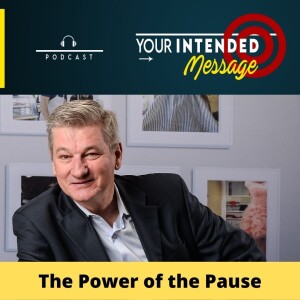
Thursday May 18, 2023
Harness the Power of the Pause when Speaking
Thursday May 18, 2023
Thursday May 18, 2023
Ten ways you can use the pause in your presentation for greater impact
Why is the pause such a powerful tool yet abused
Episode 152:
In this episode George Torok examines the power of the pause and presents 10 reasons and examples to use in your presentation for greater success.
- Are you using the purpose on purpose to engage your audience?
- What lessons can you take from comedy about the pause?
- When are good times to insert the pause?
- How long should you pause?
- What if you pause by mistake?
- How can you embrace and enhance your comfort with the pause?
George Torok is a specialist in communication skills. He coaches executives to deliver their message more successfully. That might be in conversation or presentation.
Learn more about his programs and the results of his clients at
https://www.speechcoachforexecutives.com/
Get your weekly presentation tips at
-----
Excerpts from this episode:
The old cliché suggests that “Silence is Golden”. There are times when you might appreciate some silence in your life. On the other hand, silence can feel disquieting, disturbing and anxiety ridden.
When you are speaking to an audience you might consider silence the enemy or the sign of a bad presentation. Imagine that you get lost in your thoughts and stop speaking. You go silent and anguished while trying to recover and start speaking again. You might even feel that any noise is preferable to silence. That’s when the umms and ahhs escape your lips.
Don’t panic. Consider the positive benefits of pauses in your presentation. Even an unplanned pause can be perceived positively by the audience.
Many speakers would improve the power of their presentation if they inserted tactical pauses throughout their presentation. The ability to pause might be the most important technique that speakers need to learn. It might sound simple but like many simple lessons, it’s not easy.
It can be extremely difficult to pause when you are delivering a presentation. You might feel compelled to speak because you believe silence is the enemy. You perceive pausing as a sign of weakness. The reality is that silence could be your most powerful communication tool.
Perhaps you’re not convinced. That’s understandable. Consider these examples and reasons to pause during your presentation.
-----
Recapture Attention
It’s almost impossible to hold the attention of the audience throughout your presentation. You need to recapture their attention. Pausing is an effective way to do that. Simply look at the audience with a calm smile and say nothing for as long as it takes. That could be several seconds that feels like eons to you.
Invite Interaction
When you want the audience to speak you must allow them that silence to think and respond. When you want a response, ask a question and wait in silence for the first answer. Then prod the group for another opinion and wait.
Pausing while standing before your audience can feel horrendous, yet it might be the most powerful presentation technique for you to master.
-----
Read the rest of this entry »
Tuesday May 16, 2023
Weed Words: Thanks for having me
Tuesday May 16, 2023
Tuesday May 16, 2023
If I have you, how would you feel?
If you were had how would you feel?
What is gross about this phrase?
Welcome to Weed Words, the weekly micro tip on words to avoid so you can have more credibility when you speak.
-----
Thanks for having me
What do you feel or see when you hear this phrase? Thanks for having me.
I cringe. The visual associated with this phrase is yucky.
I hosted a radio show for 19 years and interviewed over 600 guests. I continue to interview guests on my podcast, Your Intended Message. Please tune in because it’s the podcast about communication in business. Your Intended Message.
Sometimes the guest says, thank you for having me.
Yuck, I didn’t have you.
There are two ways to interpret this phrase.
You were either - duped or eaten.
The past tense of have is had. If you were had, that usually means
you were cheated. I didn’t cheat you.
The other interpretation of have is eaten.
What did you have for lunch? A hamburger. It was delicious.
What did you have for dessert? A crème Brule.
Who did you have yesterday? That’s a relevant question for Hannibal Lector. Remember Hannibal the Cannibal.
He could answer, I had a census taker along with a nice chianti and fava beans.
I suppose that the ghost of that census taker could say, “Thank you for having me. Trust that I was delicious”
Stop saying thank you for having me. It’s gross.
Instead, you can say
Delighted to be on (name of program)
Thank you for the opportunity to talk to your audience about (the topic)
It was a pleasure to discuss how people can (benefit of the topic)
Thanks for inviting to speak to your audience on (name of program)
Thank you for the engaging conversation about (the topic)
Notice how these phrases are much more thoughtful, engaging and friendly.
Until I switch to the cannibal diet, I’m not going to have you. So please don’t say, thank you for having me.
Beware of the Weed Words
Read the rest of this entry »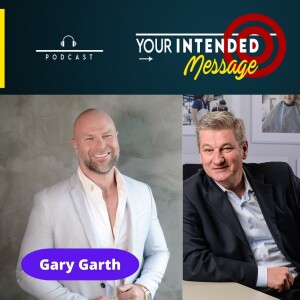
Thursday May 11, 2023
The Battle Between Sales & Marketing: Gary Garth
Thursday May 11, 2023
Thursday May 11, 2023
Why doesn't sales and marketing play well together?
How can we get sales and marketing on the same team?
Episode 150 (Gary is based in Medellin, Columbia)
__CRACK THE CODE ON SALES AND 10X YOUR REVENUE___
Because you are a loyal listener of "Your Intended Message" get your
FREE 'The Zero to 100 Million Sales Blueprint' endorsed by:
- Head of Channel Sales at Amazon
- Director of Partner Program at Microsoft
- Head of Global Sales Enablement at Google
Go to 👉 https://garygarth.com/product/zero-to-100-million-sales-blueprint/
Apply at checkout COUPON: yourintendedmessage
-----
Summary
- The importance of sales and marketing alignment. 0:00
- Three facts to know about Gary Garth
- There’s often a disconnect between sales and marketing. 2:14
- The disconnect between sales and marketing.
- How to solve the problem.
- How can one department contribute towards the other? How can we make sure that we’re speaking the same language? What kind of priorities can 4:24
- How one department can contribute to the other one.
- Best practices for sales and marketing.
- The importance of having sales and marketing as an army in the same front. 6:28
- Creating a chief revenue officer.
- Creating a weekly sales and marketing meeting.
- Why you need to understand your ideal customer profile from a sales and marketing standpoint. 8:43
- The 20 metrics sales and marketing should have locked down.
- Understanding the ideal customer profile.
- The first obstacle is creating awareness about the solution.
- The two different value propositions.
- What is the alignment between sales and marketing? How does it fit into the equation? 12:20
- Alignment between sales and marketing.
- Addressing the misalignment between marketing and sales.
- The third thing is to establish equal KPI. 14:35
- Aligning tools to make a tremendous impact.
- Establishing equal kpi.
- Practical examples of success for marketing and sales. 16:25
- Practical example, direct response marketing campaign.
- 70% of all leads come through phone calls.
- Sales and marketing each come with their own bias. Did you struggle with marketing people? 18:50
- Sales and marketing have their own biases.
- How to make sales and marketing work together.
- How to get your sales and marketing departments to work together. 21:20
- Marketing and sales need to be more open and willing to ask questions.
- The first step is collaboration.
- Aligning the two customer journeys.
- Step one, mapping out the entire customer journey.
About Gary Garth
Gary is a serial entrepreneur, founder and CEO of elevate.io. He's authored the zero to 100 million sales blueprint book, and the Goals Grit and Greatness Planner.
He's been featured in Inc, Forbes, Success and many other prominent publications as a serial entrepreneurs since 2002.
Gary has started and successfully exited six companies, including large outbound sales, call centres, radio advertising networks, and an award winning eight figure, digital marketing agency.
-----
Gary Garth's current projects include:
-----
Excerpts from this conversation with Gary Garth
That's, I guess that's the million dollar question here.
What I see in nine out of 10 scenarios, when I work with companies, the very first thing you can do to get an immediate assessment of how much collaboration there is between these two departments, how well they understand each other, and what areas of opportunity you can address is get them in a room together, and then had them both map out the entire customer journey.
So before they even become a customer, their prospect and that whole process to when they become a customer and understanding also, if you're looking at it from a as a as a business owner standpoint, their ability to cross sell, upsell products, collect testimonials, create case studies, how many referrals
Do you have understanding that whole process and aligning on all the different metrics? You will probably get one very clear picture from sales. And another picture for marketing.
So aligning those two customer journeys, less as and heavy one universal one will always tend to spark a lot opportunities because sometimes, the customer is continuously has communication with the account manager account executive in b2b, for example, but do they know exactly when to identify an upsell across an opportunity and how to promote it?
Could marketing for example, provide some content or collateral case studies, an ROI calculator that can demonstrate if you did x, y, z and expanded your service from Package A to B or added this or the product to the equation?
Here's the expected impact financially speaking as a result of that, all of a sudden, you'll see a lot of revenue opportunities.
So just mapping out the entire customer journey. That would be step number one.
-----
Read the rest of this entry »
